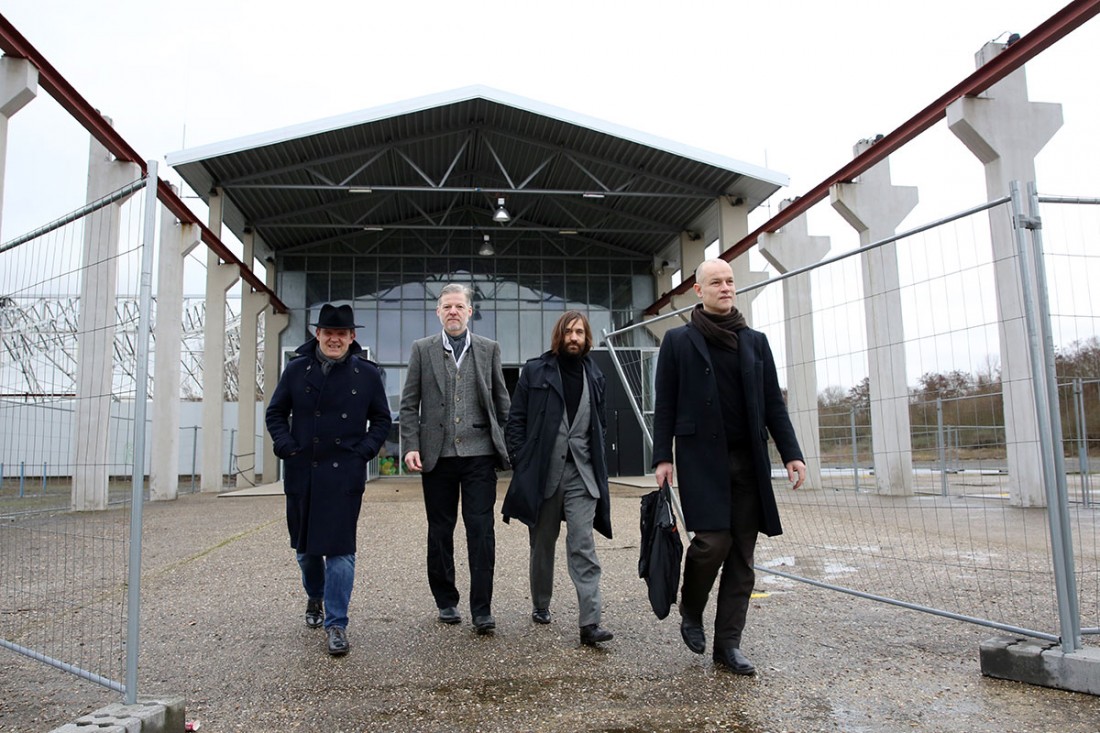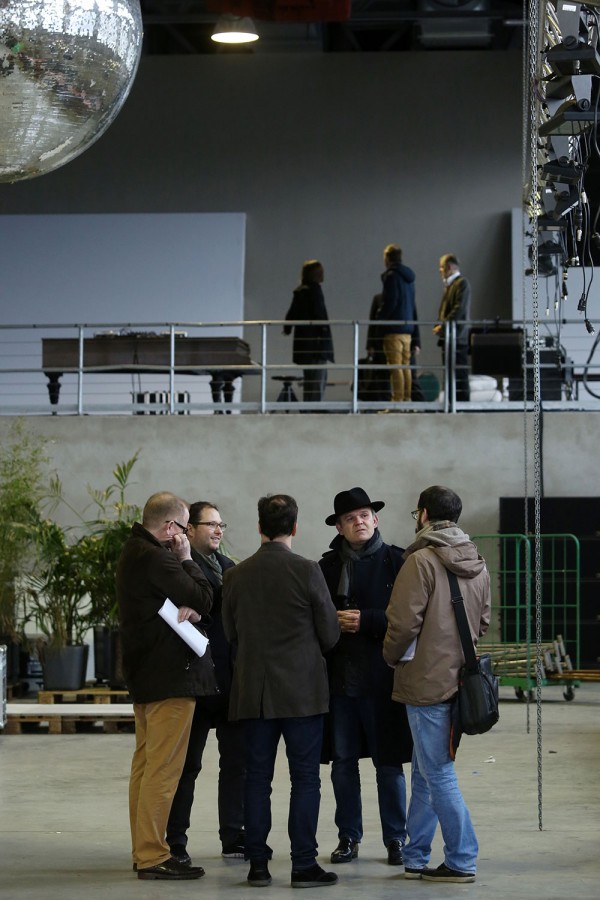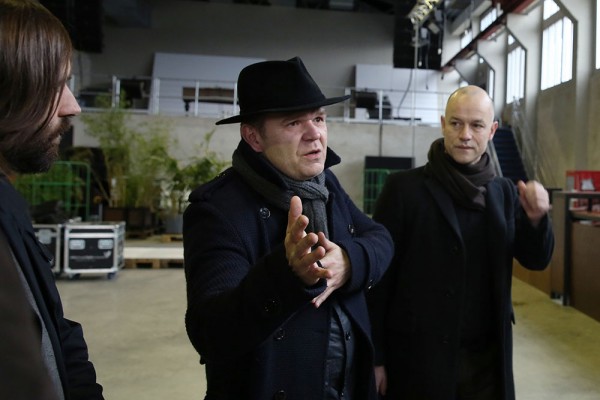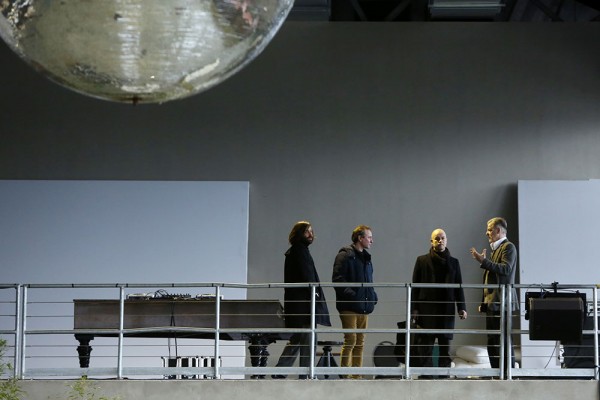Dialogue of questions

Francois-Xavier Roth, Wolfgang Voigt, Gregor Schwellenbach und Marcus Schmickler (von links) auf dem Weg zum Gürzenich Orchester. (Photo: Martina Goyert)
With „City Life“ Kompakt records and the Gürzenich Orchestra did put the different threads of electronic music between club and musique concrète for two nights into a productive dialogue. While playing the compositions of Steve Reich, György Liget, Edgar Varèse, John Adams and Pierre Charvet, the Cologne based producers Gregor Schwellenbach, Marcus Schmickler, Wolfgang Voigt and the Gürzenich Orchestra under the direction of Francois-Xavier Roth deconstructed boundaries and set a mark for soft fences of artistic collaboration.
Correspondingly we asked Gregor Schwellenbach and Marcus Schmickler for a dialogue of questions.
Gregor Schwellenbach: Marcus, has there really been this golden age of music in Cologne, in which the experimental musicians of all genres had been interested in each others and played records to each other at nights, is true?
Marcus Schmickler: It certainly was a bit more cool. The Liquid Sky, for example, was a club, in which, separated by nights, totally diverse music could be played, but still everyone had a great time. The people form a-Musik, with whom I hung out mainly, used to mix Autechre with Parmegiani and movie scores and Japanese noise with Luc Ferrari and Hawtin. Those kind of opposite settings worked as well as warm-ups as in after hour sets and at techno parties. It was equally plausible to someone with a post-Fluxus-turntableism understanding of music as to someone who came from scratching and deejaying. There were, of course, some who were not interested in experimental approaches and who saw house and techno as the advancement of pop. The contemporary, so called serious music scene did hardly register it – those who showed up thought it rather has to be too loud and apparently not dialectical enough.
The unity of an inherently diverse scene has never existed – this notion however is not completely false as well. A lot of people realized, that something was happening, that first and foremost did not alone happen in Cologne – and that connected us to that people out there. People with a lot of different backgrounds could agree on the common roots and the with this associated discourses of electronic music, separate of the genres. Maybe the electronic music wave hit on a special resonance chamber in Cologne because historically so much had happened in the Rhineland already, like „Elektronisches Studio at WDR and Krautrock, that was not without importance internationally.
Marcus Schmickler: Gregor, how did you experience this time? Is it true, that the question of genre does interest you less as an experience of time, contemporaneity, and lifestyle, but rather from the perspective as an instrumentalist? How do you asses this development?
Gregor Schwellenbach: The background to my question is the desire, that I had for Cologne during that time. Following krautrock, reggae and freejazz I discovered classical music, when I was 18, not just as substance, but also as style, as iconic inventory. Before that I had played in several pop bands, then I used arguing over style, adoring female cello players and wearing black suits to feel a bit like Antoine Doinel in one of Truffaut’s movies. For my studies I had moved, of all things, to Hanover, there I had heard about what had been happening in Cologne. I have been reading magazines like Spex and Debug – in the library of the conservatory! – and the whole time I had been thinking, that I had to return as soon as possible, so I could get involved. It took quite a while.
I do not at all see myself as an instrumentalist, rather as a composer or arranger. Musically I kinda think like a DJ, director or curator and then I use instruments to realize my phantasies. That’s why I play a lot of different instruments, without ever having aspired for a career as soloist in any one of them. My main instrument at the conservatory was after all not piano, but double bass, and I got my diploma in musical composition.
Gregor Schwellenbach: Marcus, I don’t know about any other composer with an academic background, who has such a credible underground coolness as you. And that although your music seems definitely intellectual. Did nightlife, going-out, dancing, snogging and drugs play any role in your musical development?
Marcus Schmickler: Thanks for the compliment! The nightlife did of course play an important role for myself and is hopefully still playing one, as interesting music arises there. Back then I moved with my home studio to London, because of the second summer of love and acid, but at first it wasn’t really clear to me, where that was supposed to get me to. At the same time I had already been involved in interesting projects in Cologne and so I came back after almost a year. I cannot really express this more precisely, but nights apart from the „shit-raves“ – how Alec Empire used to call those events, that quickly became commercial – are and were an important epiphany moment for my notion what music can achieve – for a community as for each individual. In part as ecstatic, in part as cathartic tilt-point for relationships to others and to oneself. I have to admit, that I mostly went home earlier, because I wanted to go to the studio the next day, instead of party for three days, but I would even be able to tell based on particular productions how these experiences, or even my notion of music began to unravel. And that was a good thing. I did encounter contemporary music concurrently to this, its differentness of sound, and its consistency did impress me. Only last fall, at Unsound, I did play after Shackleton and before RP Boo, and the audience did receive this contentual stretch utterly terrific.
Marcus Schmickler: Gregor, how about you and the nightlife – classical musicians are so very disciplined and have to practice all the time… What do you think can a dialogue with the music, that plays at Gürzenich, achieve?
Gregor Schwellenbach: I regard this concept of discipline of classical music as very romantic. It has to do with loneliness, and with the paradox to be a controlled, seemingly virtuous guy, so you can channel the maximum of passion in the end. I am not impacted that much by discipline. In the world of traditional, classical music I do feel comfortable, but not at home, and I feel the same about electronic dance music. I like to go out, mostly alone, and value clubs and club music as a means to nonverbally secure your otherness, both as a group in contrast to the rest of the society and as an individual in contrast to the group. It’s also great, if it feels as if everything can happen before dawn, from complete loss of identity, to discussions on biology and transport policy, to a spontaneous trip to the sea – and certainly if the music alone amazes me tremendously.
The music, that’s being played by the Gürzenich Orchestra at the Wassermannhalle doesn’t seem to far removed from that. The program offers exactly the aspects of modern music, that has to be instantly plausible for clubbers and friends of electronic music. It doesn’t elude from access, but is immediately satisfying in a physical manner. It is a great deal about autonomous sound and about power, also about provocation, as well as repetition, groove and aesthetic of sampling. You and Wolfgang are there as electronic artists, who will offer enough reasons for strict friends of new music, to listen into the depth.
I do believe, that the concert will kick down open doors, because its program doesn’t pander, doesn’t pursue alleged convergence by refusal of class, but instead bets on the same passion for interestingness, that is being perceived by a pleasant intersection of concert goers of both tradition. I myself have been waiting for years for this implicitness.
Gregor Schwellenbach: Marcus, you are celebrating maximum motionlessness at your performances. Are you indiscernibly operating your computer the whole time or are you mainly playing prepared sequences? No, I rather not now!
Marcus Schmickler: What? Do you wanna know or not? (In the latter case you’d have to stop reading NOW!)
My shows do actually go off relatively different. Sometimes I do not know what is going to happen up until the moment when I’m on stage and touch the first key, that evening is being completely improvised. Other shows are planned through completely and I am creating a mix live, am working on the sound and on the spatialization, both aspects are comparably important to me. It’s virtually the same procedure as with notated music, when composed music is being interpreted in front of the audience that night. Performances are alway codified, of course. How and where the musician is sitting or standing, tells the audience something about an attitude, that cannot be avoided. If you are positioning yourself up front, or turning away, if it is bright or dark, if you are sitting within the audience, or firing up the fog machine, and so on. In my case speakers are not only a reproducing system, they are my instrument. They are sounding from different directions, you can hear their interplay the best way from the audience, that is also an argument for me to perform from there. The motionlessness I did neither learn by watching Kraftwerk, nor has it anything to do with the anti-artist-, anti-rockstar-comprehension. I do not have a lot of use for interfaces like electric harps, sensors and whatnot – that’s where an arts-and-crafts praxis does show through, so much translation is already happening. I don’t see it as an asset to just tackily project my scree, Look, how great I am at operating live-code and reading e-mails. My instrument is just a computer, that I’m operating with a keyboard. I think, it’s predominantly about listening.
Marcus Schmickler: Gregor, how are you able to find your own voice as a pianist, with all that historical ballast? And how do you handle, that you have practiced so much, that you are able to play so many ambitious pieces and now the music is so allegedly simple?
Gregor Schwellenbach: The second part of the question is easy: I’m not at all interested in virtuosity, I’m just as influenced by punk as every reader of this. I would explain this to a classical musician like this: I’m amused by the complexity of Stockhausen or Boulez, but I love the simplicity of Feldman or Cage.
How to find my own voice, on the other hand, is a question, that I am going to pose to myself for as long as I live. But I have hope: Before I started releasing music under my own name, I had been working as a composer for theater, radio plays and TV. Back then I made an effort, to compose, for every production, without ego, just for the needs of each project, and choose another approach every time, if possible. Now, with some distance to the projects a recognizable sound, a common theme can be noticed, and that is my character, who forges through without intention. I guess you can recognize a very kindred character in a lot of electronic music – especially in Cologne. And concerning the piano: I like to use it as abstraction, as instrument with wich you can express imagined music in a reduced mode. And to test how the character changes, if I reduce music to pitches and rhythms and thereby coquet with high culture references. This sometimes helps me to develop interesting ideas and transcribed engine sounds or an acid track inspire me to a piano piece, that no one else would write otherwise

















